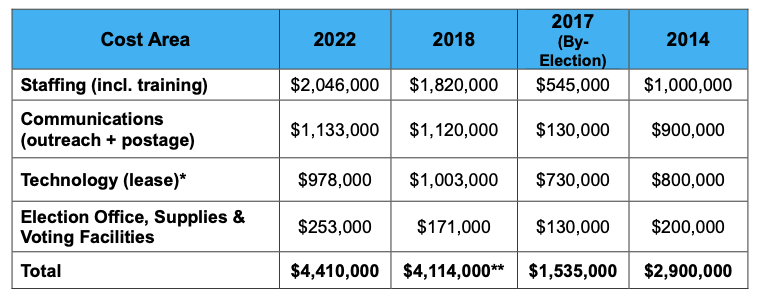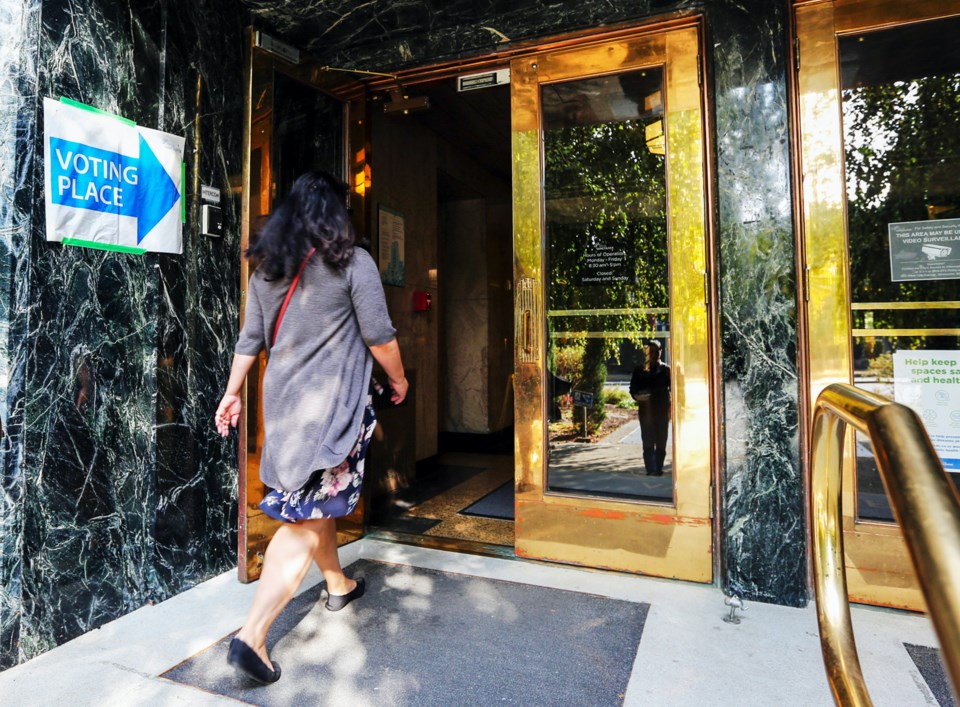The City of Vancouver’s cost to run the 2022 civic election totalled $4.4 million.
The tab was $296,000 more than the final bill for the 2018 election and a $1.5-million increase over the vote in 2014, according to a review report of the Oct. 15, 2022 election, which was scheduled to go before council Thursday.
The largest increases in costs in 2022 over 2018 related to staffing, with new election positions created and others funded over a longer period of time to allow for proper planning and implementation of new program initiatives.
“These included new communication and outreach initiatives, vote by mail expansion, increase in elector worker wages to compete with neighbouring municipalities, new accessibility initiatives and the introduction of the homebound voting pilot program,” said the report authored by the city’s chief election officer, Rosemary Hagiwara.
“Many of the initiatives were implemented as a result of recommendations made by the advisory committees, best practice research and feedback received during the 2018 election.”
Total staffing cost was $2 million.
2,948 election workers
Another cost involved the addition of 10 advance voting places across the city over five days of voting that required an additional 2,948 election workers over the advance period compared to 2018.
Providing more advance voting and election day voting places meant more ballot tabulators and laptops were required, which increased technology costs, said the report, which included recommendations that, if implemented for the 2026 election, would likely mean an additional increase in spending.
“As the election becomes more complex with technology and potential legislative changes, election delivery should be considered to be an ongoing city program rather than a project,” the report said.
“The research and planning [should] start at least 2.5 years before the election year after the completion of post-election work. It is recommended that additional resources be allocated to an election program for future elections.”

Voter turnout 36.3 per cent
Even with increased spending in the 2022 vote, the dial on voter turnout was not moved significantly, although at 36.3 per cent it was greater than Richmond (24.4 per cent), Burnaby (19.8 per cent) and Surrey (34.5 per cent).
Voter turnout in Vancouver in the 2018 race reached 39.4 per cent.
The report noted the pandemic may have influenced the decrease in turnout in 2022.
A Research Co. survey conducted following the election asked respondents why they didn’t vote. Thirty per cent said they didn’t know enough about the candidates and 18 per cent said the same about campaign issues, according to the survey, which was attached to the report.
Other responses included the person was out of town (13 per cent), forgot to vote (12 per cent), didn’t have time to vote or couldn’t fit into schedule (12 per cent), didn’t feel like vote would make a difference (12 per cent) and have a general dislike of politics (12 per cent).
Nine per cent said they didn’t like the candidates.
ABC Vancouver spent $2 million
Ken Sim and his ABC Vancouver party handily won the election, with all of the party’s candidates running for council, school board and park board victorious in their campaigns.
The party spent spent just over $2 million in its sweep to power, according to documents posted in February on the Elections BC website.
The documents showed ABC spent $1,695,452 on the mayoral, council and park board commissioner campaigns and $402,610 to get its school board candidates elected Oct. 15.
Sim told Glacier Media in a previous interview that his party’s victory was simply not a financial transaction, saying: “It’s the party that works the hardest and reaches out to the community [that wins].”
Sim, who defeated Kennedy Stewart, said he and other ABC candidates knocked on thousands of doors and made thousands of phone calls during the campaign — a point he made recently when a Globe and Mail report suggested China’s Vancouver consulate had influenced the results of the election.
Sim told reporters March 16 that if there was proof of foreign interference in the election, he wants to know about it — “because I’m a Canadian.”
“I was born here,” said Sim, who was visibly angered by what he described as insinuations that the Chinese government somehow influenced his victory. “I was raised here. I went to school here. I started two businesses here. I raised my family here. I chose to be here. I love Canada.”
Sim continued: “I’d like to see proof of this. Because I tell you one thing, if there is proof of this, I’d be mad as hell as everyone else. But right now, there are a bunch of insinuations, and it’s actually quite hurtful.”
City of Vancouver communications staff sent an emailed statement to Glacier Media March 16 that said no staff had met with officials from the Canadian Security Intelligence Service regarding the election.



